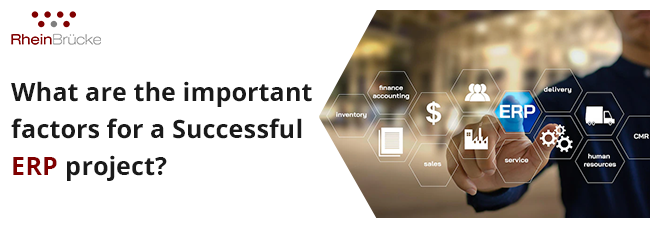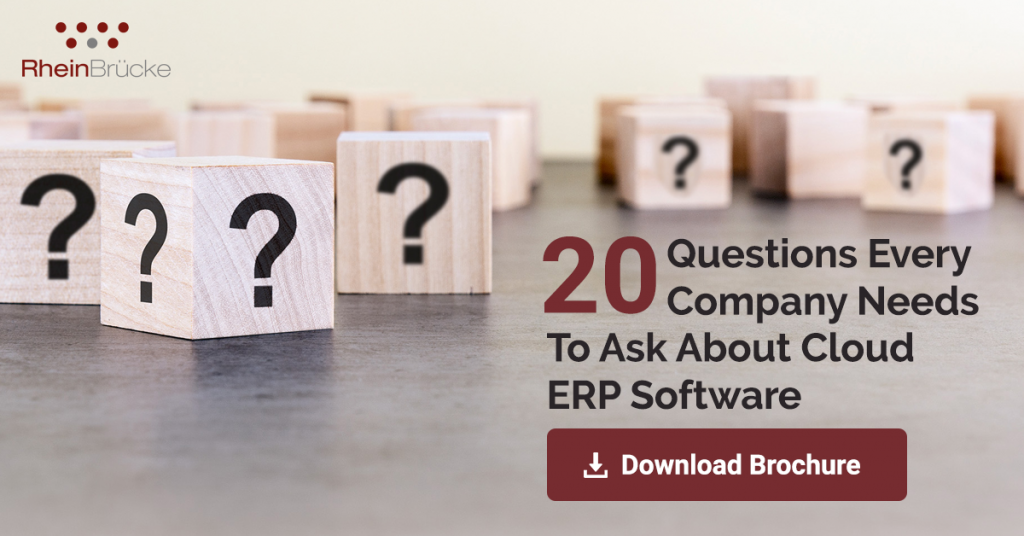
The critical factors for a successful ERP implementation and Project success
ERP implementation is one of the most critical steps for any organization to start the digital transformation journey of the business. It enables businesses to bring all their operations together into one central solution. However, ERP implementation is a complex process and there can be many challenges that arise throughout the project. An ERP project demands a lot of commitment from the organization and the stakeholders. For large organizations, it can cost a huge amount of money and can be a costly mistake if not implemented properly. There are many examples of organizations that have experienced ERP failures leading to serious consequences such as financial meltdowns, revenue loss, reputation damage and so on.

The reason for most ERP failures is not the solution or technology, but not factoring in various project management aspects from project planning to Change Management. Project management plays a crucial role in helping the project meet its desired objectives. In this blog, we discuss the key factors for a successful ERP implementation of a project.

PLANNING
A job well begun is half done. Every ERP project starts with Project Planning. Project planning is important for the project to ensure aspects like stakeholder/resource availability as well as techno-functional dependencies are factored in to achieve project objectives. We work in a globally fluid environment where the projects can be based anywhere across the globe. Hence, it is important to consider the geographic location and the time zones while planning any activities. These things when neglected during the planning phase can lead to a lot of complexities later. The public holidays, business peak times, etc are to be considered as a factors for a successful ERP implementation of a project.
Once this has been taken care of, key activities for successful planning include the work breakdown structure for all phases of the project. It is crucial to have transparent communication between the teams. It is important to have regular meetings to understand project requirements and plan them accordingly. All members who are involved with the project should understand the execution plan and should be given enough time to collaborate with the team and the client.
SCOPE
The scope of the project is very important for the project to be successfully implemented. Scope creep, no matter how small or big impacts the timeline and cost of the project. The scope of the project should be fixed and the deliverables should be clearly defined during the planning phase of the project. It should be ensured that the scope of the project is clear, open, and transparent.
Develop an ERP project scope keeping in mind your business’s core objectives, existing systems and processes your organization uses, and which ERP modules are needed to ensure that your ERP fits your business priorities.
There should be a clear understanding of the scope within the project team. It is good to detail what your project is going to include, document items that are not in scope and what may be included in a future release. Moreover, avoiding scope creep doesn’t mean completely avoiding improvements or adjustments to your original scope of work, but scope management deals with making those alterations after putting in a thorough evaluation and prioritization. Any scope changes to the project have to be communicated clearly to stakeholders and should be ideally initiated via a formal change request process to make sure important stakeholders are in the loop and willing to support additional tasks.
STAKEHOLDER MANAGEMENT

Many projects fail because the interests and requirements of stakeholders are given insufficient attention. It is important to understand the project stakeholders to effectively manage the stakeholders. Any person or group of people who impact the project or will be impacted by the project are termed as the project stakeholders. Identifying the stakeholders right at the beginning of the planning phase by categorizing them based on their interest in the project versus how much they can influence the project is a key step. This helps us to identify a strategy on how to manage them. Understanding their business and their culture is necessary to understand and implement stakeholder management. Stakeholder management can bring out benefits such as the commitments from the top leadership who can influence and drive the project in the right direction, enhance user adoption, etc. It should be ensured that all key stakeholders from all relevant domains have been included right from the beginning of the project. This will eventually help in identifying all requirements and avoid any scope creep. It is also necessary to communicate and engage them throughout the course of the project.
DATA MANAGEMENT

Data management or data migration is one of the most important aspects of a successful ERP project to ensure that the data in the new ERP system is accurate and complete. Poor data quality can lead to a less effective ERP system or can even result in project failure due to inaccurate or duplicate data. Organizations often underestimate the time and efforts required for data migration which can cause delays in the entire ERP implementation. Hence, it should be made a number one priority from the first day of the project. All the data sets that are to be migrated are to be put in sequential order. Collection of the right data and cleaning of the gathered data is necessary for efficient data migration.
There should be a clear understanding as to what is the data that needs to be migrated. Much of your data may not be needed. It’s the right time to get rid of your outdated data. It is also crucial to understand that data delivery, data extraction and data transformation need to be ensured repeatedly throughout the project.
CHANGE MANAGEMENT

Change management is usually an underrated topic in project management. It helps to identify the readiness of the organization for the change in its operations. To put it simply, it includes approaches to prepare, support, and help individuals, teams, and organizations make organizational changes. Improving your Change Management increases your chances for a successful ERP implementation. Effective change management watches for any “red-flag” issues and helps to avoid scope and time creep and keeps an eye on quality issues. It also helps to reduce project risks by providing enough information to all key players in the project and keeping surprises to a minimum.
It is important to ensure that there is alignment between the corporate strategy and project strategy. To successfully understand change management, it is important to understand the current operations and processes in the organization. A clear vision of what change the implementation brings and communicating the change across the organization is the key to successful change management. Training end users also usually falls under change management. Effective end-user training is critical to make the most of the ERP once it is implemented and hence to ensure project success.
COMMUNICATION
Communication is very crucial for any ERP project to be successfully implemented. Especially, when the project is at a global level, timely communication on the project status and advancement is very crucial between the project team as well as across the organization. The key aspect of effective communication is to make it as simple and precise as efficient as possible. It should not be expected to convey the message that is being communicated in the first attempt. It is crucial to facilitate repetition until the information is received at all levels. Mediums such as internal sites (SharePoint, Yammer, etc.), newsletters, and team lunch and learns, all could assist you in delivering your message.
CONCLUSION

An ERP implementation project can be completed successfully if carried out with proper preparation, planning and execution. We hope this quick blog will help organizations plan for an ERP project more efficiently. Organizations considering these 6 key factors can definitely increase their odds of success. Watch our webinar below to hear from our experts on strategies for ERP project success.
At RheinBrücke we follow our proven SCALE methodology based on the Six-sigma process for ensuring successful ERP projects. Feel free to contact us if you need any help with your ERP project.
RheinBrücke Academy offers courses on Project Management and SCALE Methodology. Write to us at education@rheincs.com to know more.




